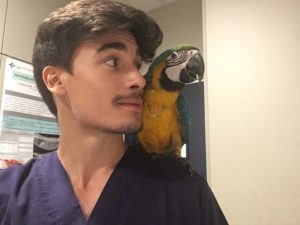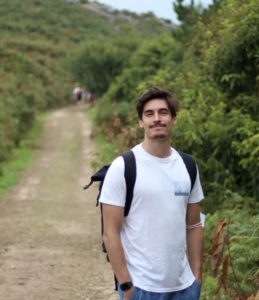 Pol Sarquella is a clinical veterinarian specialising in exotic species and wildlife. He holds a Master’s degree in OneHealth and another in Pharmaceutical Marketing. After an internship in South Africa he returned to Europe to live and work. Now, after spending a few years as an exotics clinician, he’s decided to reorient his career. Find out what the profession is like from the perspective of an exotic species clinician.
Pol Sarquella is a clinical veterinarian specialising in exotic species and wildlife. He holds a Master’s degree in OneHealth and another in Pharmaceutical Marketing. After an internship in South Africa he returned to Europe to live and work. Now, after spending a few years as an exotics clinician, he’s decided to reorient his career. Find out what the profession is like from the perspective of an exotic species clinician.
What prompted you to study veterinary medicine and how has your initial career path evolved?
All the wildlife and National Geographic documentaries were the main culprit. I attended a talk by Jane Goodall on Primatology and from then on I wanted to help in the conservation of endangered species. But as time went by I started to ground myself in day-to-day concepts.
During my final year of internship in South Africa, I realised that there are many zoonoses that affect both the animals and the population. I understood that veterinarians were key to preventing zoonoses and managing wildlife from a healthcare point of view. I went from an idealised image of African wildlife conservation to reality and saw how we could contribute as veterinarians.
After returning from Africa and doing a clinical internship in pets and exotic animals, you decided to work only with the latter. Can you tell us about that?
Dedicating myself to the exotics and wildlife clinic in Europe was like being a small part of the whole. Exotic species fascinate me; reptiles, birds, and mammals. I thought that as a vet I could learn about them, better understand how they work and help them by creating the best possible environment for them when they’re living outside their natural environment.
What resources have you missed in the centres you’ve worked in as an exotics vet, which are mostly dedicated to dogs and cats?
When you work in a mixed clinic and you’re the exotics clinician, you tend to work in a very isolated way – it’s like your department is something foreign to the rest of the hospital. The exotics specialist must have a multidisciplinary background and sometimes it can be difficult to cover everything. A strong degree of involvement with complementary services such as anaesthesia, surgery or emergency medicine ensures that all species receive specialised treatment in all fields of medicine and improves success rates. It’s important for Practice Managers to understand that everything works best when all the services are integrated.
As exotic veterinarians, how do you deal with compassion fatigue, attachment and grief management? Isn’t it easier not to get attached to animals that don’t seem to create as much of a connection with humans?
No, quite the opposite. In general, they are species that create very strong bonds with their keepers. From the outside, it may not seem important if a rabbit, a hamster or a ferret doesn’t get better. But if you’re an exotic vet, you’re here because you like these kinds of animals, so when they don’t do well you suffer just the same. I’ve spent just as many hours monitoring and worrying about dogs as I have about ferrets.
Euthanasias are not as impersonal as people think. Also, in exotics we may end up performing more euthanasias because they are sensitive species that don’t show typical clinical symptoms so they often arrive in very delicate shape. And so we also have to be very good at communicating bad news and managing critical moments day in and day out.
 Have you experienced professional burnout or witnessed it in your colleagues?
Have you experienced professional burnout or witnessed it in your colleagues?
I guess I’ve experienced sometimes some symptoms related to burnout and seen it in some colleagues. In some moments it has gone well and I was able to manage it, but in others the workload combined with the daily emergencies makes it more complicated. In my opinion, it’s a situation that is much more widespread than we would like in our profession and it needs to change.
When you rethink whether it is worth continuing, no matter how fascinating the species or how much you like your work, there’s something not working.
You left the clinic a little over a year ago. What expectations did you not see being met that led you to a change in career?
I decided to reorient my professional career for several reasons. If the conditions for personal, professional and economic growth are not fulfilled, and if there’s also so much trouble in balancing work and personal life, you consider a change. Personally, this was linked to a change of priorities and I made the decision.
Considering a career change is based on many facets, different for each person, but I believe that burnout in our profession can play an important role. Luckily, our profession has many different avenues and opportunities that can be really exciting, so change doesn’t have to be bad!







